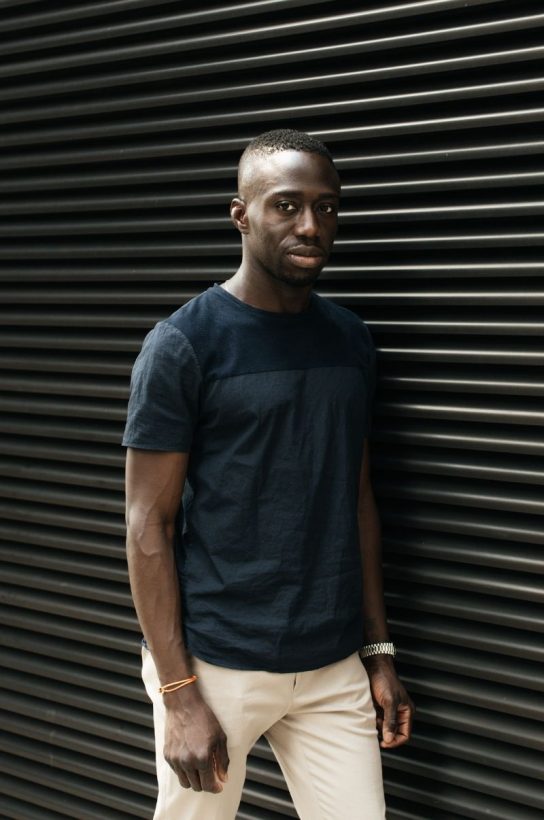CODE Meets Iré Hassan-Odukale, Ikoyi
Published 8 April 2022
by Henry Southan

Credit: Maureen M. Evans
CODE caught up with Iré Hassan-Okudale, co-founder of Ikoyi, the micro-seasonal fine dining restaurant in St. James’s. It’s a busy time for the restaurant. We talked about what it takes to turn a mere idea into a successful business, and what needs to change to make hospitality a more appealing career for young people.
How is everything going at Ikoyi?
Good! Very busy, especially since February. Since we got our second Michelin star there hasn’t been a single quiet day.
How did you become introduced to co-owner Jeremy?
I met him while I was at school actually. We ended up leaving our jobs and I knew I wanted to do something in hospitality, so we thought of the concept and gave it a go.
Did you always see yourself in this industry?
No, not at all. I worked in the city for 6 years. It was being able to take care of people that really drew me to the hospitality industry.
How was it putting together your team of chefs and front of house?
Finding chefs was easy! We have an abundance of chefs wanting to join us which has been nice. Front of house has been not so easy – it’s been interesting that’s for sure. We’re almost there.
Why do you think that is?
I think in the pandemic, chefs were still cooking as it’s more of a lifestyle job where cooking is their full-time career and they love cooking, whereas front of house talent seemed to move on to try other industries.
Were you a regular restaurant visitor before starting Ikoyi?
Yes! With Jeremy too, we used to spend a ridiculous amount of money actually. Money we didn’t have on tasting menus! That was the main thing we did together actually.
What is Ikoyi in your words?
It’s quite difficult to define. I’d say we’re a micro-seasonal restaurant that takes inspiration from different ingredients, some West African, some Asian, from all over the place. Jeremy is very innovative. We source a lot of British food too, so a British restaurant I guess?
What do you think about the pricing of restaurants – do you think the industry should charge more?
Since Ikoyi, I’ve stopped eating out so much. I think generally prices are good at the moment. Most restaurants run with relatively small margins so they struggle to make any decent profit. I don’t think fine dining restaurants charge too much – they’re a business at the end of the day.
How important is food sourcing for Ikoyi?
Sourcing is one of the most important things for us. Food sourcing has such an influence on Ikoyi and what we do every day. We’re ingredient-led.
How was it to be welcomed with such high appraise?
Well, when we first opened it was a very different restaurant. We had 42 covers and tables were really close together like a canteen! People would come in and have Jollof rice and pay £20 and sit at the table for two hours. We can’t pay our rent with that. When you’re in such a small place, you have to aim for a higher price point to carry the business.
How regularly does the menu change?
Quite regularly. Dishes like Jollof rice have been on the menu since day one. Jeremy’s working on a new menu now actually which is coming out soon. It changes quite regularly because it’s micro-seasonal and it’s dependent on what we get sent by the farms each day. Certain things will change every day but structurally the menu will go through a big change every quarter.
What are the best and worst things about working within the hospitality industry?
People, and people! People in terms of watching our team excel and grow in an industry they love, and people again in terms of when it doesn’t always go to plan and some guests who don’t appreciate hospitality folk when they’re trying to give them a great experience. Sometimes it can be demotivating when that happens.
How can hospitality be made a more appealing industry to work in?
I think it has to go back to schools, colleges and universities because, by the time you leave uni, the attitude is still that hospitality is just a job to make ends meet rather than a career. I think people who have made a success in this industry should be in these schools inspiring students and letting them know that hospitality is an option as a full-time career.
Do you have any advice for anyone who has a concept for a restaurant they want to launch?
Yes, I’d say don’t and that you must be very brave. I’m afraid there’s no easy path, no one can really guide you or mentor you, you have to learn yourself. There’s no book you can read to find out all the answers.
How would you define great service?
Attentive. Great people, who can assess the guest and what kind of service they’re looking for and tailor the experience to them. Service shouldn’t be identical for everyone. Good service is about personalising the experience to the guests’ requirements.
What do you think about the legislation that’s been put in place about displaying calories on menus?
Calories are not always a bad thing. I think it could be bad for people as you shouldn’t make decisions just because of the calorie content. It would be impossible for us. It would take ages to work out and give us less flexibility if Jeremy changes dishes last minute for example.
Are you optimistic about the industry as a whole?
It seems people are getting in with things and new restaurants seem to be opening up. Most restaurants erm to be buzzy and full. People aren’t shying away. Staffing is getting harder too because there are so many new places opening. I’d say applicants have more power now as they have more choice of where they want to go. Recruitment is the hard bit. The last 5 interviews we’ve had organised didn’t turn up. They didn’t send an email or anything.
Are you open to training people with less experience?
We’ve had to. Of course, it would be easier to have experienced people as training takes time but we’re doing a lot more of it. It can also be a positive to have less experience as often experienced FOH will bring habits from their previous jobs that don’t align with how we do things at Ikoyi.
Where can we see you eating on your day off?
Kanada-Ya probably! I go there a lot – it’s so good and easy.




